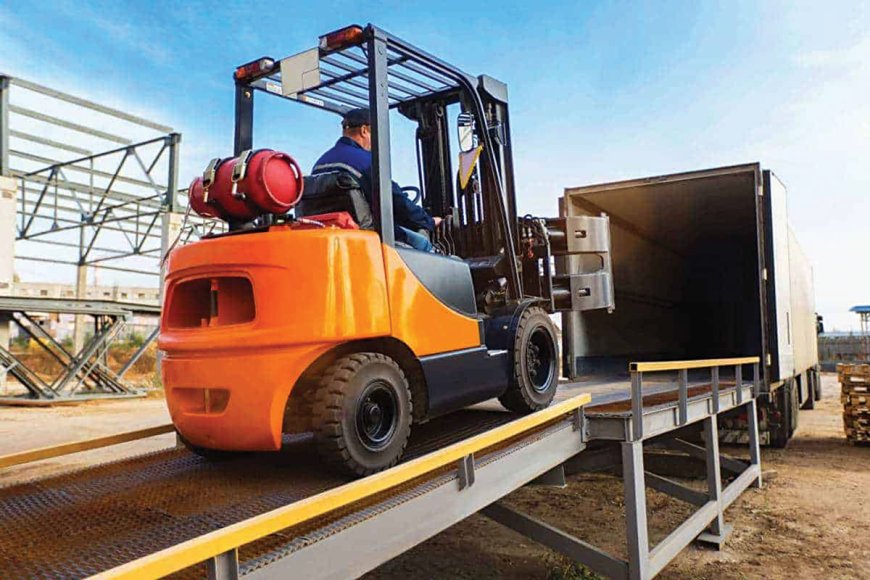THE FORKLIFT TRUCKS MARKET: Driving Efficiency and Productivity Across Industries

Forklift trucks have become indispensable tools in modern industries, revolutionizing the way materials are handled and transported. From warehouses to construction sites, these machines play a pivotal role in improving operational efficiency and reducing labor costs, finds Persistence Market Research.
The forklift trucks market continues to evolve, driven by technological advancements, increasing demand for e-commerce logistics, and the need for sustainable and efficient solutions. Below, we delve into the key aspects shaping the forklift truck industry.
The forklift trucks market is projected to grow from USD 61.9 billion in 2024 to USD 103.6 billion by 2031, with a CAGR of 7.6% according to the persistence market research. Growth is driven by rising e-commerce demand, government initiatives, and increased industrialization. Asia Pacific leads the market with a 56.3% share, supported by key manufacturers like Doosan Corporation and Hangcha Forklift, while Europe focuses on sustainable supply chains. Counterbalance forklifts dominate with a 52.2% share in 2024, and electric motor forklifts are growing rapidly at an 8.2% CAGR due to eco-friendly and cost-effective benefits. Compact forklifts are gaining traction as warehouse spaces narrow, further boosting market demand.
The Growing Demand for Forklift Trucks in Diverse Sectors
Forklift trucks are versatile machines that cater to a variety of sectors, including manufacturing, retail, logistics, and construction. The rise of e-commerce has been a significant driver of demand, as warehouses and distribution centers require efficient material handling solutions to manage increasing order volumes. Additionally, the construction industry relies heavily on forklifts for transporting heavy materials, enhancing productivity on job sites.
Agriculture is another sector where forklifts are making inroads, with farmers using these machines to handle bulk quantities of crops, feed, and other materials. This growing adoption across diverse industries underscores the critical role of forklift trucks in modern economies.
Technological Innovations: Shaping the Future of Forklift Trucks
Technological advancements are at the forefront of the forklift truck market’s evolution. Automation and the integration of smart technologies are transforming traditional forklifts into intelligent machines. Features like autonomous navigation, advanced sensors, and telematics systems enhance safety and operational efficiency.
Electric-powered forklifts are also gaining traction due to their environmental benefits and lower operational costs compared to internal combustion engine (ICE) models. Lithium-ion batteries, known for their long lifespan and fast charging capabilities, are becoming the preferred choice for many businesses.
Moreover, the implementation of Internet of Things (IoT) technology allows for real-time monitoring and predictive maintenance, reducing downtime and optimizing performance. These innovations are not only improving productivity but also aligning with the global push towards sustainability.
Market Dynamics: Trends Driving Growth in the Forklift Trucks Industry
Electrification: The shift towards electric forklifts is driven by stringent environmental regulations and the need for energy-efficient solutions. Electric models now dominate the market, particularly in indoor applications.
Rise of Automation: Autonomous forklifts are becoming increasingly popular in warehouses and factories, enabling businesses to streamline operations and reduce labor costs.
E-commerce Boom: The rapid growth of e-commerce has intensified the demand for material handling equipment, as businesses strive to manage high inventory turnover and ensure timely deliveries.
Focus on Safety: Manufacturers are prioritizing safety features, such as collision avoidance systems, ergonomic designs, and stability controls, to mitigate workplace accidents.
Customization and Versatility: Businesses are seeking tailored forklift solutions to meet specific operational requirements, driving demand for versatile and customizable models.
Challenges Facing the Forklift Trucks Market
Despite the positive growth trajectory, the forklift truck market faces several challenges. High initial costs for advanced models, such as autonomous and electric forklifts, can deter smaller businesses from adoption. Additionally, the lack of skilled operators and technicians to handle sophisticated machines poses a hurdle.
Supply chain disruptions, as witnessed during the COVID-19 pandemic, have also impacted the availability of key components, causing delays in production and delivery. Addressing these challenges will be crucial for manufacturers to sustain growth and meet evolving customer demands.
Regional Insights: Key Markets for Forklift Trucks
The forklift truck market exhibits varying growth patterns across regions. Asia-Pacific holds the largest market share, driven by rapid industrialization, urbanization, and the expansion of e-commerce in countries like China and India. North America and Europe also represent significant markets, with a focus on automation and sustainability.
In the Middle East and Africa, infrastructure development and the growth of the logistics sector are fueling demand for forklift trucks. Latin America, though smaller in market size, is witnessing steady growth due to increasing investments in warehousing and industrial projects.
Sustainability: The Shift Towards Green Forklift Solutions
As environmental concerns take center stage, the forklift truck industry is embracing sustainability. Electric forklifts are replacing diesel-powered models in many applications, significantly reducing carbon emissions. Manufacturers are also exploring renewable energy options, such as solar-powered charging stations, to complement electric forklifts.
Recycling and remanufacturing programs are gaining traction, enabling businesses to extend the lifecycle of forklift components and reduce waste. These initiatives not only benefit the environment but also contribute to cost savings for companies.
Future Outlook: What Lies Ahead for the Forklift Trucks Market
The forklift truck market is poised for continued growth, driven by technological advancements, rising industrialization, and increasing demand for efficient material handling solutions. The integration of artificial intelligence (AI) and machine learning (ML) technologies is expected to further enhance the capabilities of forklift trucks, enabling predictive analytics and advanced automation.
Collaborations and partnerships among manufacturers, technology providers, and logistics companies will play a key role in shaping the future of the industry. Additionally, government initiatives
promoting sustainable practices and investments in infrastructure will provide a conducive environment for market expansion.








